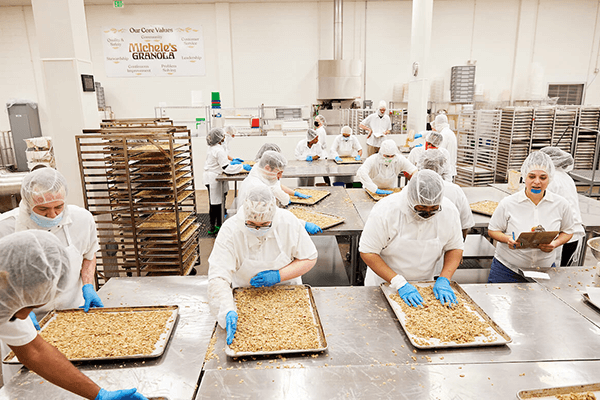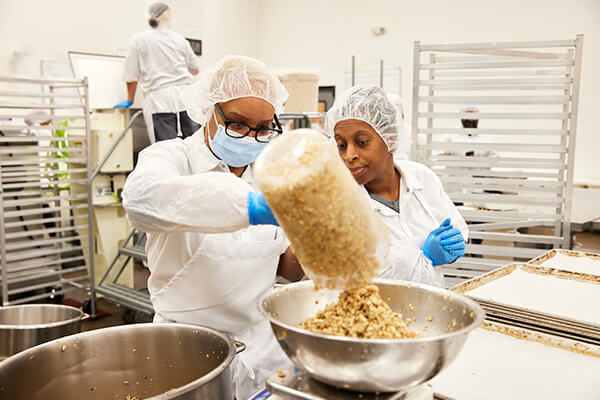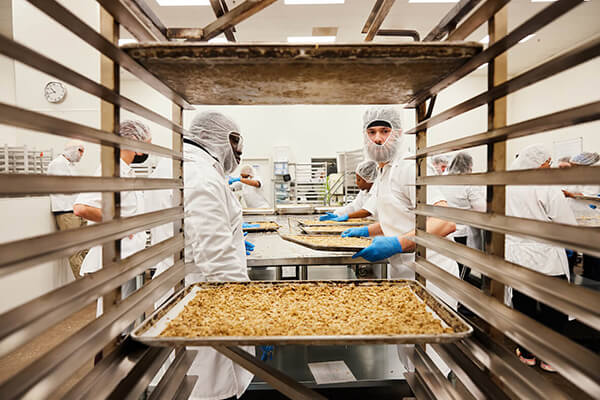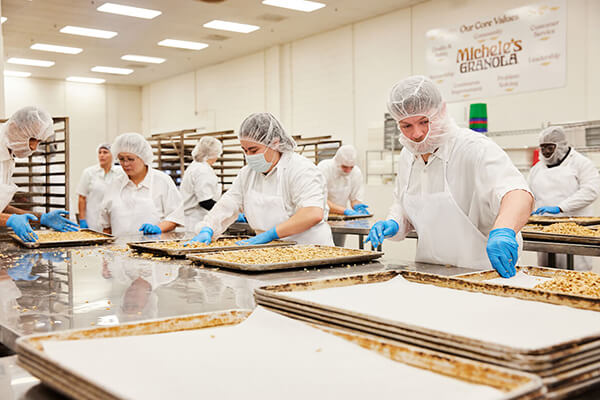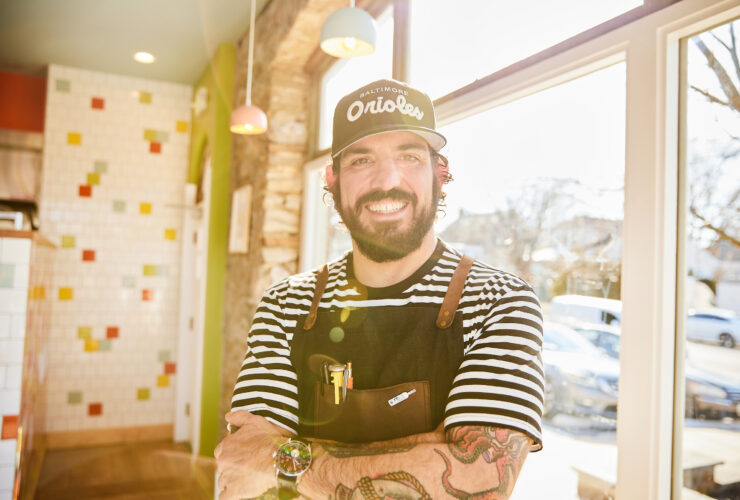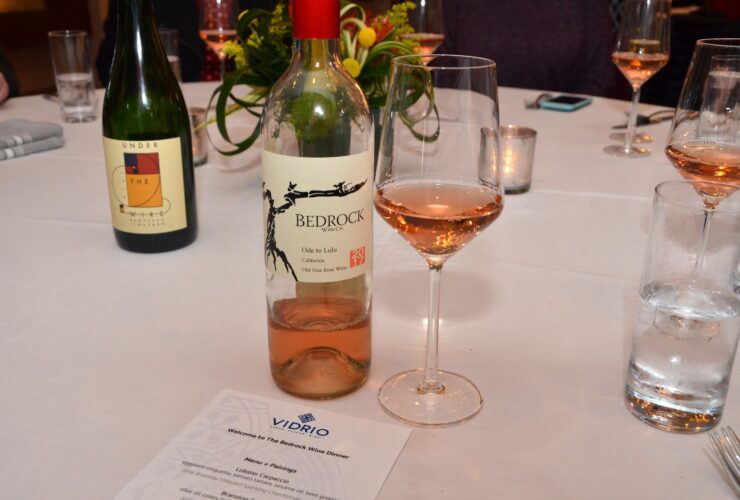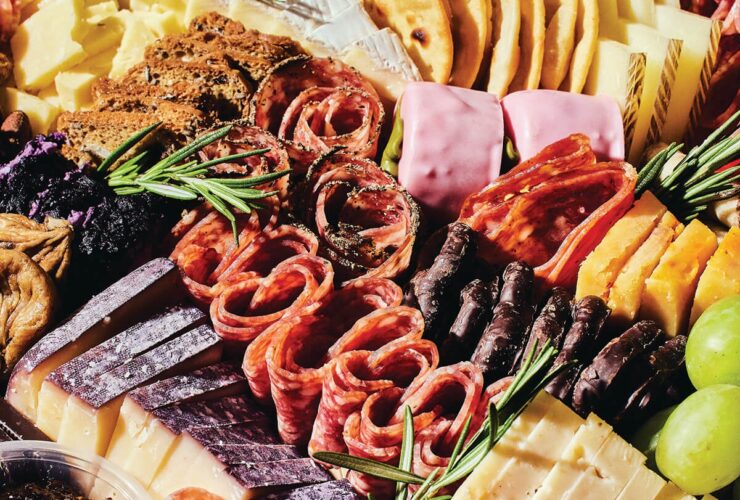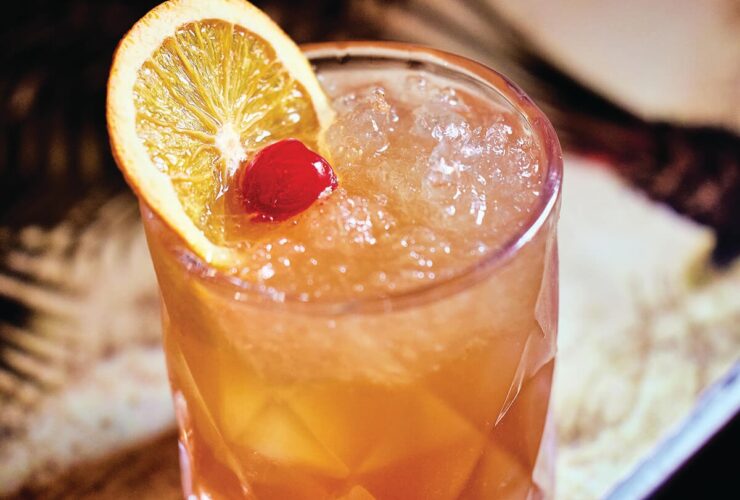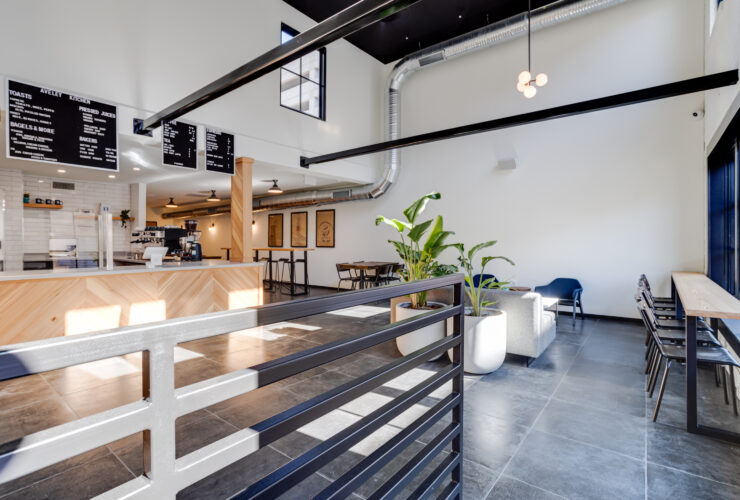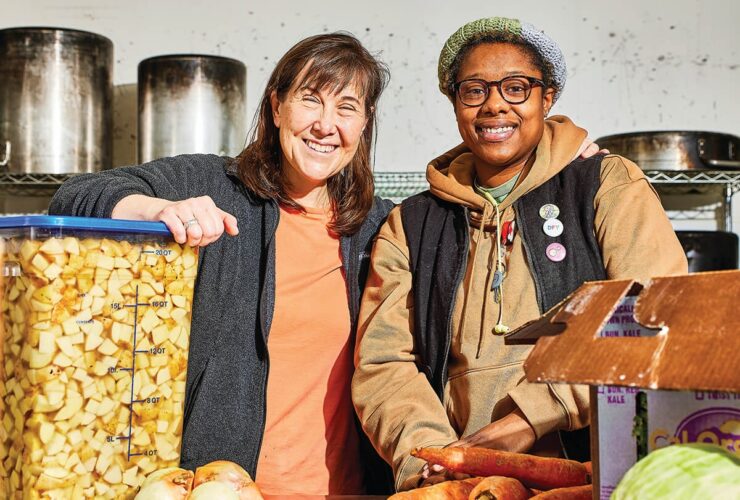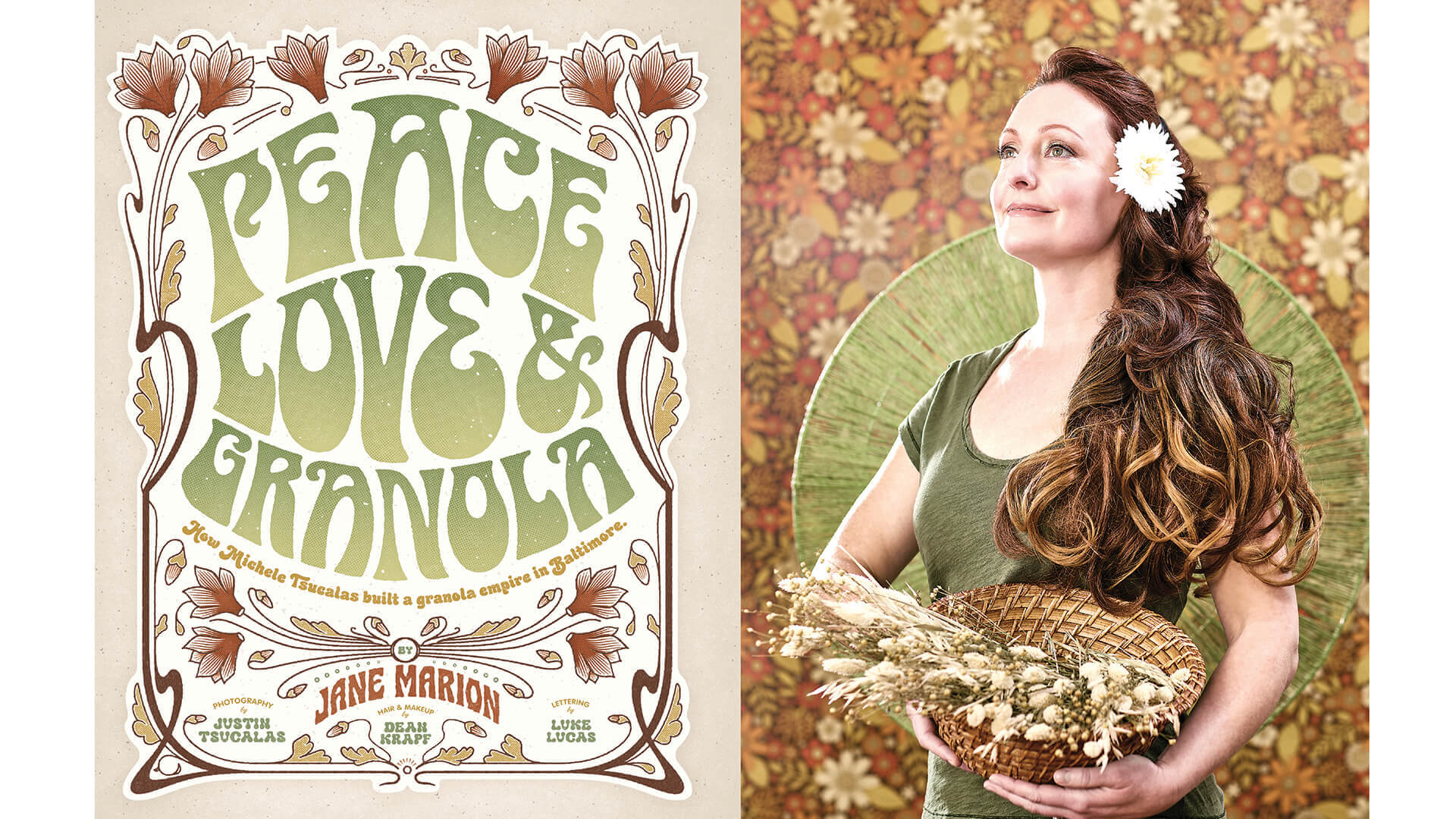
Food & Drink
Peace, Love, & Granola
How Michele Tsucalas built a granola empire in Baltimore.

By Jane Marion
Photography by Justin Tsucalas
Lettering by Luke Lucas
Hair & Makeup by Dean Krapf
 ON AN EARLY FALL MORNING, inside a
run-of-the-mill Timonium office park, a
kitchen staff dressed in white aprons, white
chef shirts, and bouffant caps measures
and mixes, spreads and smooths, bakes
and breaks, and finally bags and boxes
sheets of granola. Against the backdrop of
shiny steel ovens, industrial-sized mixers,
and walls papered with hygiene signs, the
crew works with yeoman-like efficiency for
a brand that has quietly become a made-in-Maryland cereal superstar.
ON AN EARLY FALL MORNING, inside a
run-of-the-mill Timonium office park, a
kitchen staff dressed in white aprons, white
chef shirts, and bouffant caps measures
and mixes, spreads and smooths, bakes
and breaks, and finally bags and boxes
sheets of granola. Against the backdrop of
shiny steel ovens, industrial-sized mixers,
and walls papered with hygiene signs, the
crew works with yeoman-like efficiency for
a brand that has quietly become a made-in-Maryland cereal superstar.
Twenty-four hours later, Michele’s Granola—seven flavors in all, from almond butter to lemon-pistachio, plus seasonal and limited-edition varieties—will get shipped to some 3,500 grocery stores across the United States, including Whole Foods Markets, Giants, Krogers, The Fresh Markets, Sprouts, Wegmans, Graul’s Market, Eddie’s of Roland Park, as well as mom-and-pop markets (not to mention online on Amazon). The food product—once an “itty bitty granola baby” in the words of its founder—has a footprint in virtually every state from Maine to Hawaii, and it is now one of the top-selling premium granolas in the country.
“It’s amazing that we sell so well in California,” says Sam Hopkins, the company’s senior materials manager, as she stands in the neatly organized warehouse, piled floor-to-ceiling with boxes marked “Denver,” “York,” “South Carolina,” “Atlanta,” and “Mendocino.” “California is the birthplace of granola—you’d think they have their own small-batch scene, but they love ours.”
Behind this powerhouse product is the brand’s namesake, Michele Tsucalas, whose likeness appears on the label—an illustration inspired by the work of Art Nouveau artist Alphonse Mucha featuring a Mother Nature-like goddess with golden locks and a basket of grain cradled in her arms. Ironically, when people find out that she makes granola, they assume it’s just a hobby. Says Tsucalas, “When people hear that I make granola, or they taste the granola for the first time, they say, ‘This is so nice—do you have a kitchen in your garage?’”
Clearly not. Making the granola from start to finish at her sprawling 25,000-square-foot production facility takes somewhere between two-and-a-half to three hours per batch. By the end of each weekday, 8,000 pounds of granola will be made over the course of two nearly round-the-clock shifts.
It’s no small feat, creating a star food item in a sea of similar products, but Tsucalas has defied the odds. Beyond its terrific taste, what sets the granola apart is its unique texture. Though the foundational recipe—a combination of oats, nuts, seeds, coconut, brown sugar, and oil—seems classic, it’s inexplicably crisp, featherlight yet dense, yielding a healthful, hearty, addictive mix. You’ll find it on grocery stores shelves in the cereal aisle, but it’s also the perfect anytime snack—a go-to energy booster for wilderness walks, a topping for yogurt, and even ice cream.
—Video by Justin Tsucalas
And while the process of making it is a proprietary secret, the key, says Tsucalas, is doing things by hand, from smoothing the granola onto trays before it gets baked to breaking it into smaller pieces after it comes out of the oven—at which point the product is checked not just for that right honey-hued color, but crunch, based on the sound of the snap (similar to the sound of shattering glass) to make sure the moisture has been baked out. Bagging, too, is done by hand so that the pieces hang together in fat, crunchy clusters.
Founded 17 years ago, the bootstrap start-up is now a major player on the cereal scene. The company is projecting $15 million in revenue for 2023, a number that’s even more impressive given that annual revenue for female-owned businesses averaged $475,707 in 2021, according to Forbes. Not bad for a brand that started as a farmers’ market stand, then hit it big when six 12-ounce bags first sold at a Whole Foods Market in north Baltimore.
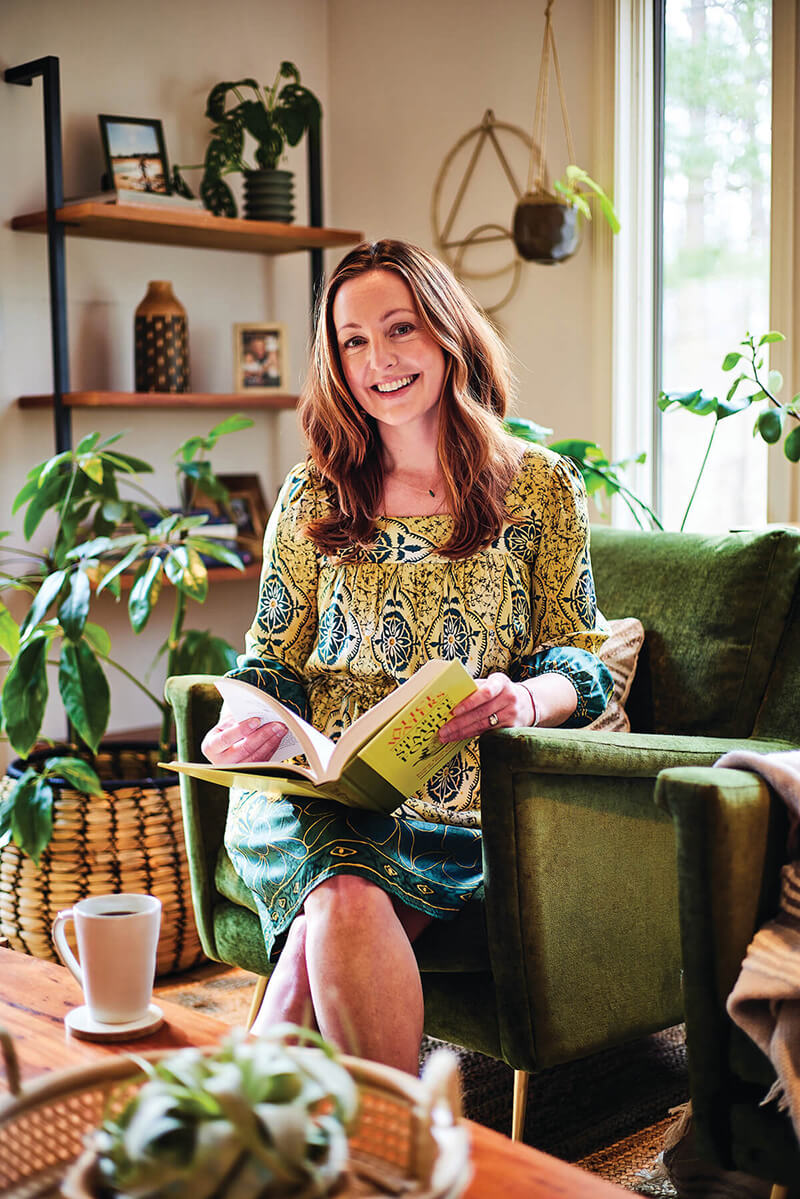
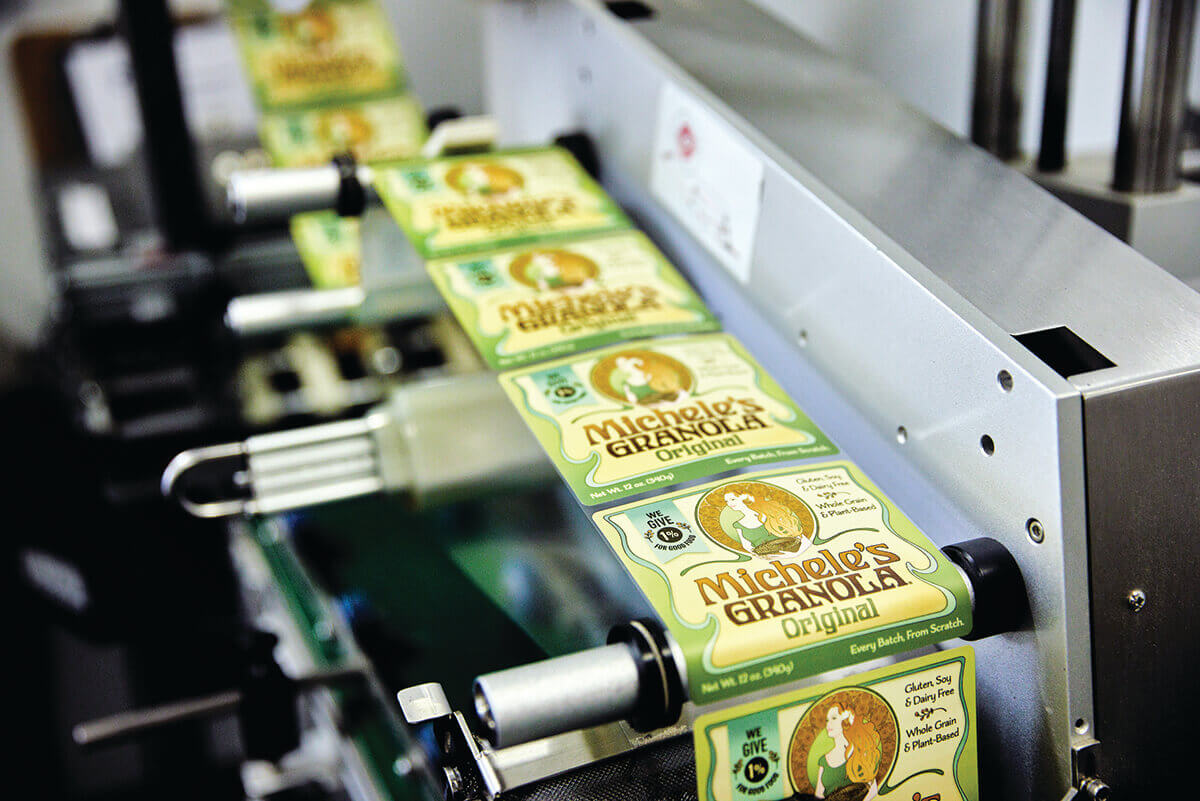
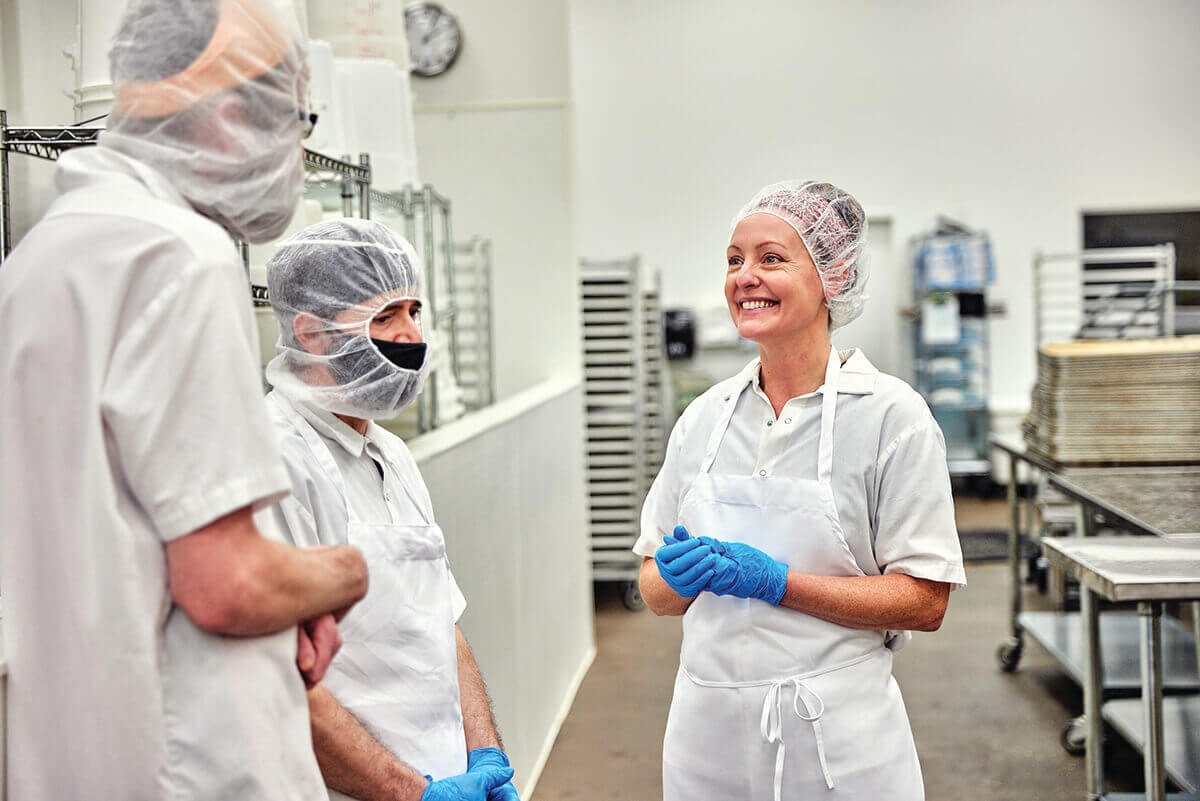
Clockwise from top: Tsucalas sits in her Lutherville home; Tsucalas talks with kitchen staff; labels being printed.
SITTING ON A MOSS-GREEN velvet chair in her beautifully appointed Lutherville home, amidst an array of handmade pottery, wicker baskets, textured pillows, and plants, the 44-year-old Tsucalas—with her long brown mane, dangly earrings, peasant dress, and bare feet—is exactly the kind of person one might envision behind such delicious granola. She exudes an inner peace. And when she smiles, which she does frequently, her face brightens.
“We make granola and sell granola,” says Tsucalas, who shares her home with her husband, Justin, a photographer (and contributor to Baltimore who shot the images for this story), their two children, Oliver, 9, and Hazel, 8, and their sheepadoodle, Miles, who bounds around the house with toddler energy. “It’s very simple, but it’s important to have a story.”
Tsucalas’ story starts in Montgomery County, where she grew up, just down the road from her father’s dental practice. Her mother worked there as well. “At a young age, I had this sense of the freedom and flexibility that working for yourself provides,” she recalls.
Baking was an early interest. “My mom wasn’t a big cook,” she says. “I grew up in the ’80s and it was all about convenience. I remember when we bought our first microwave. The meal preparing was meant to be quick and there were other things you would pursue because of the time it saved.”
But, unlike her mother, Tsucalas enjoyed spending time in the kitchen. “One year, my mom made a cake, put the first candle in it, and it exploded like the turkey in National Lampoon,” she says, laughing at the memory. “From that point on, I stepped up to make the birthday cakes. I experimented with different flavors—I’m sure a lot of it came from a box—but it was the contentment that I got from the process and the joy that it brought people. That just stuck with me.”
After graduating from Duke University in 2000 with an economics degree, as her peers moved into jobs in investment banking, Tsucalas contemplated her future. “I remember the day Morgan Stanley came to recruit on campus—I just didn’t feel it,” she says. “It wasn’t that I couldn’t do that, it just wasn’t something I was interested in.”
In her early 20s, Tsucalas briefly worked for a tech company in Northern Virginia before moving to Ireland, where she worked for a year in an Asian noodle restaurant, followed by another year as a server at a pizza joint in Australia. After her Irish friends landed service jobs back in the U.S. on Martha’s Vineyard, she followed them, serendipitously landing a job waiting tables at the famed Black Dog Bakery Café. When she tasted their granola bars, still warm from the oven, it was transformative.
“They stood out to me as something that were better than anything I’d ever had before in the breakfast cereal category,” she says. “You could see every ingredient—oats, seeds, and nuts—and I loved the way the clean, whole grain, and slightly sweet flavors melted in my mouth. The whole scratch-made bakery concept was also new and inspiring to me. From there, I tried every yogurt-and-granola bowl I came across, and soon started working on my own homemade cereal.”
Back in the Mid-Atlantic again by 2003, Tsucalas worked as a fundraiser for a nonprofit. In her off-hours, she dreamed of Black Dog’s granola and decided to make her own, often sharing her goods with family and friends. “I loved people’s reactions,” she says. “I remember giving granola to a friend as she was leaving my apartment. She called me when she got home and said, ‘It’s all gone.’” Another friend convinced Tsucalas that she should try to sell it. She contemplated peddling it at local farmers’ markets but was discouraged after learning it would require a business permit and working in a commercial kitchen when she already had a full-time job.
But in 2005, she took a part-time position selling baked goods for Takoma Kitchens, a cafe that had a stall at the prestigious Takoma Park Farmers’ Market in Montgomery County. “They had long been part of the market scene and were real advocates for local farming, real food, and farmto- table living,” says Tsucalas. “That inspired me.”
Her timing was perfect. It was right as the locavore movement was seeing a resurgence and granola was once again becoming a stylish food trend, in large part thanks to the Bare Naked Granola brand, which modernized the product by putting it in a standup pouch, repositioning it as a convenient energy food in a resealable package. “They really made granola hip again,” she says. “It wasn’t just something your grandma made or a hippie thing.”
Although Takoma Kitchen did not sell granola, customers were repeatedly requesting it. One day, Tsucalas asked the owner if she might sell her own. After getting the green light, the following week she brought six tin-tied, craft-paper bags to the market—three “Original” and three with raisins, sold as “Michele’s Granola.” “I always thought I’d think of something else to call it,” she says, “but I never did.”
The granola, whose recipe hasn’t changed since the company’s founding, was an instant hit, selling out every week. Out of her tiny apartment in Northern Virginia, it took her six hours to make six pounds, but she believed that maybe she had stumbled onto something. “Early on, the feedback from customers really gave me confidence—if three people were coming back each week saying it’s the best they’ve ever had, or they’re completely devouring it, why couldn’t that be a thousand people?” she remembers thinking at that time.
Working at the market also gave her a sense of personal fulfillment. “I was drawn to the opportunity to create something of my own that had value,” says Tsucalas. “It was about making things better.” In no time at all, she amped up her production, working nights at her boss’s commercial kitchen. “I knew I was ready to leave my job,” she says, and by 2006, she decided to pursue her granola business full-time.
In 2008, she moved the business to Baltimore, where rent was cheaper, and workspace was easier to come by. Her first commercial kitchen was in Curtis Bay, a 1,000-square-foot space on the site of a former pizzeria. She had four employees at the time, including Tony Sowa, who is now the company’s national sales and distribution manager. To get up and running, she purchased a double convection oven on eBay for $3,000 with money she had saved from the farmers’ market. “On the day it was delivered, the guy took it off the back of the truck and left it on the sidewalk,” she says. “It didn’t fit through the front door.” Feeling defeated, she called Sowa, who then owned a landscaping company. “I was like, ‘It’s over.’ I just spent everything I had.” Sowa brought some of his crew, took the oven apart, loaded it through the doors, and then rebuilt it. Then, says Tsucalas, “we were rocking and rolling.”
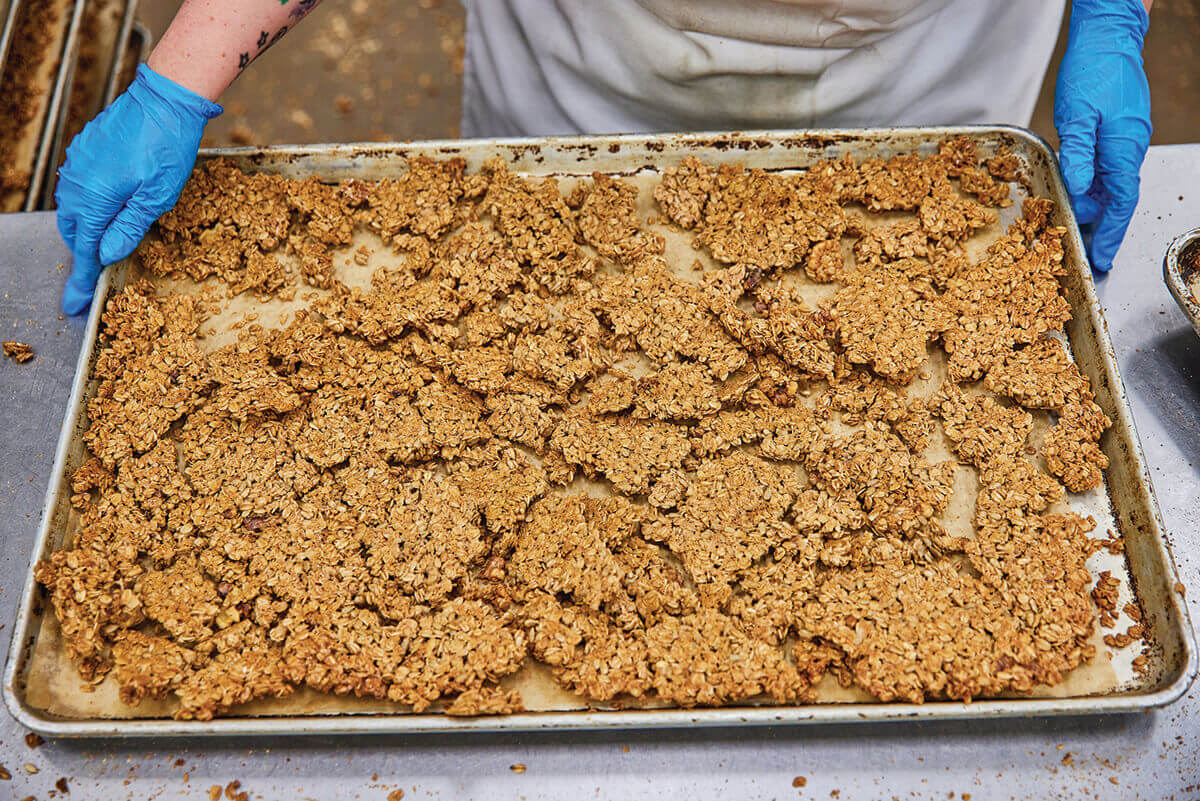
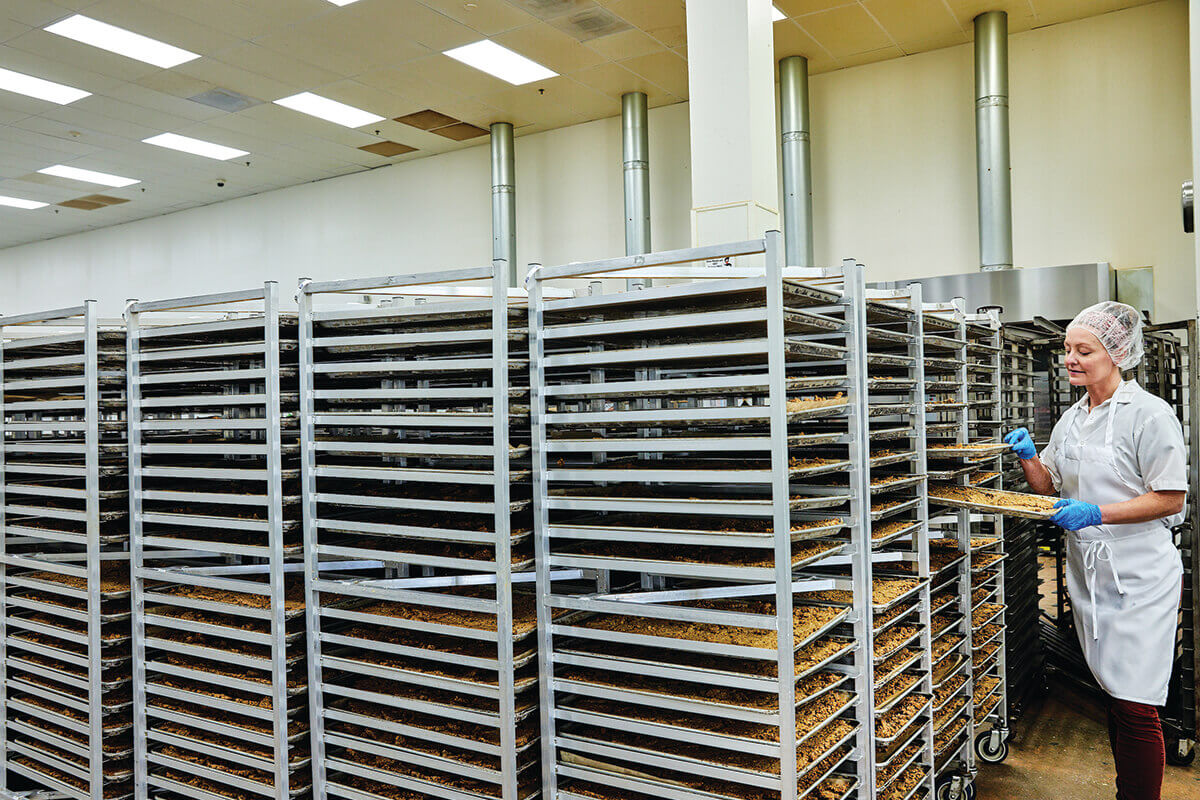
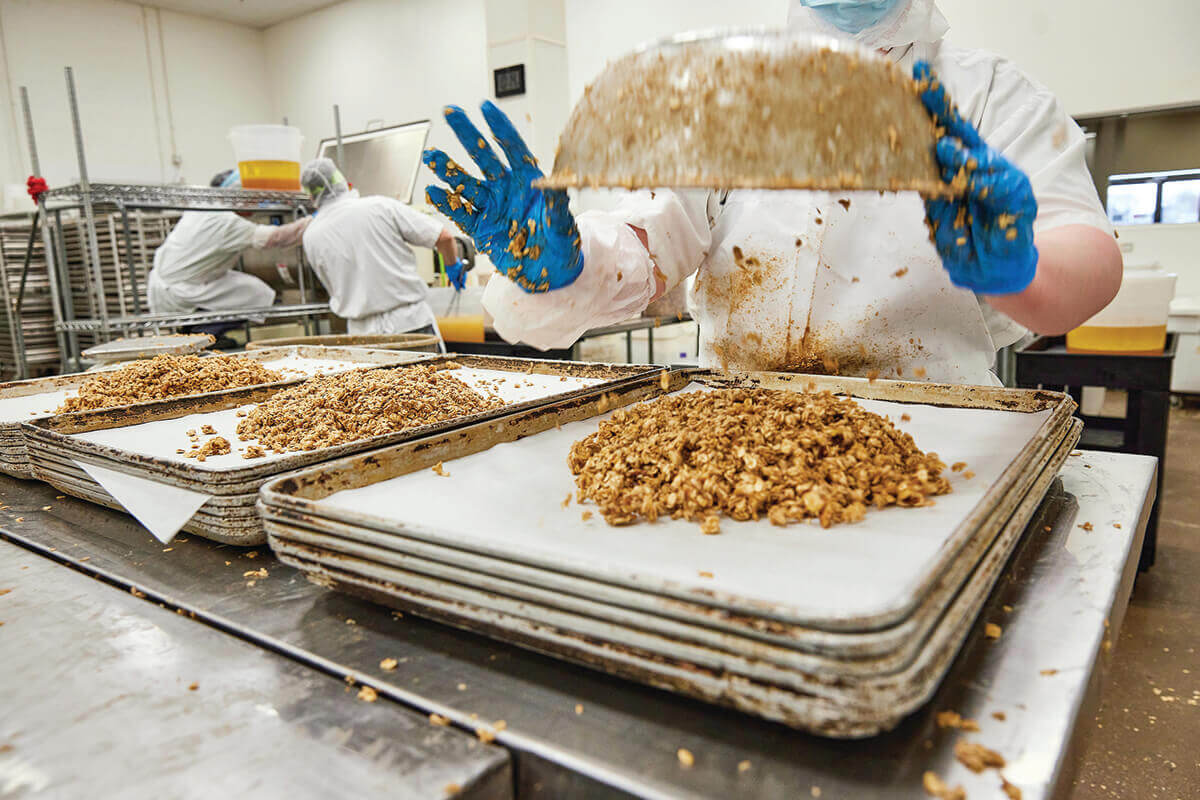
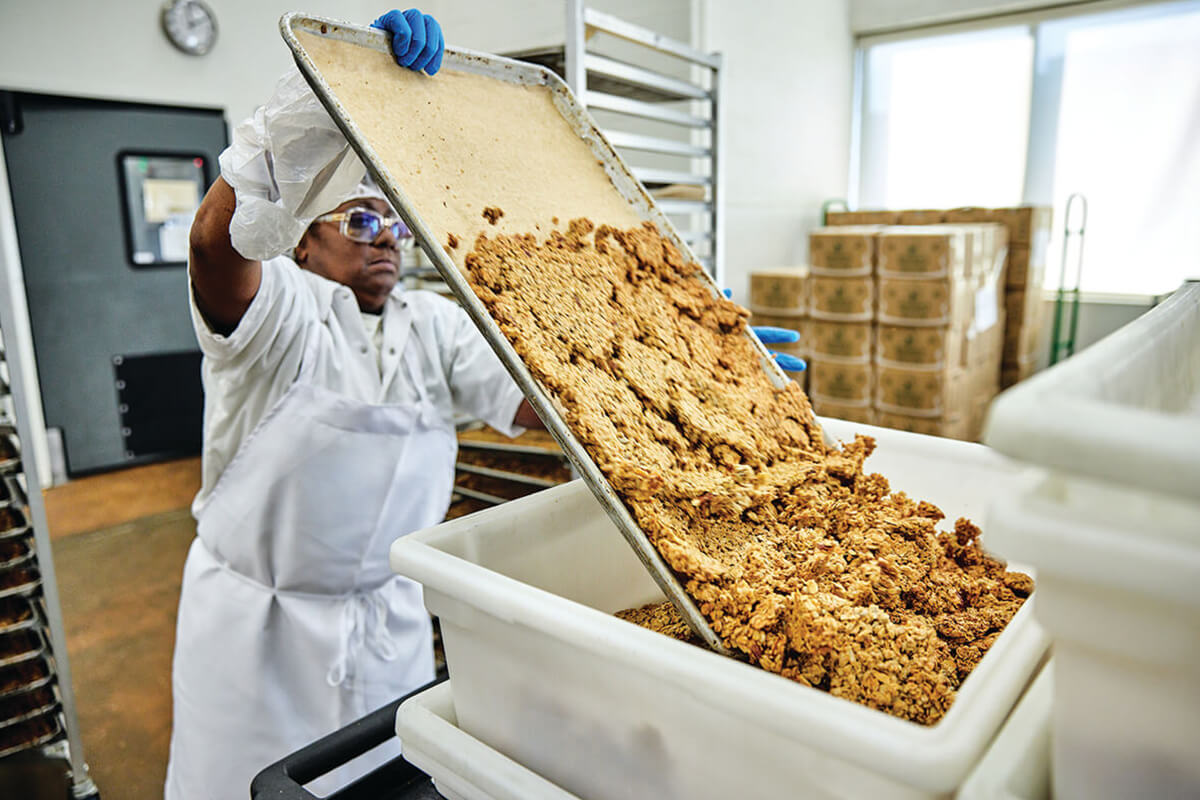
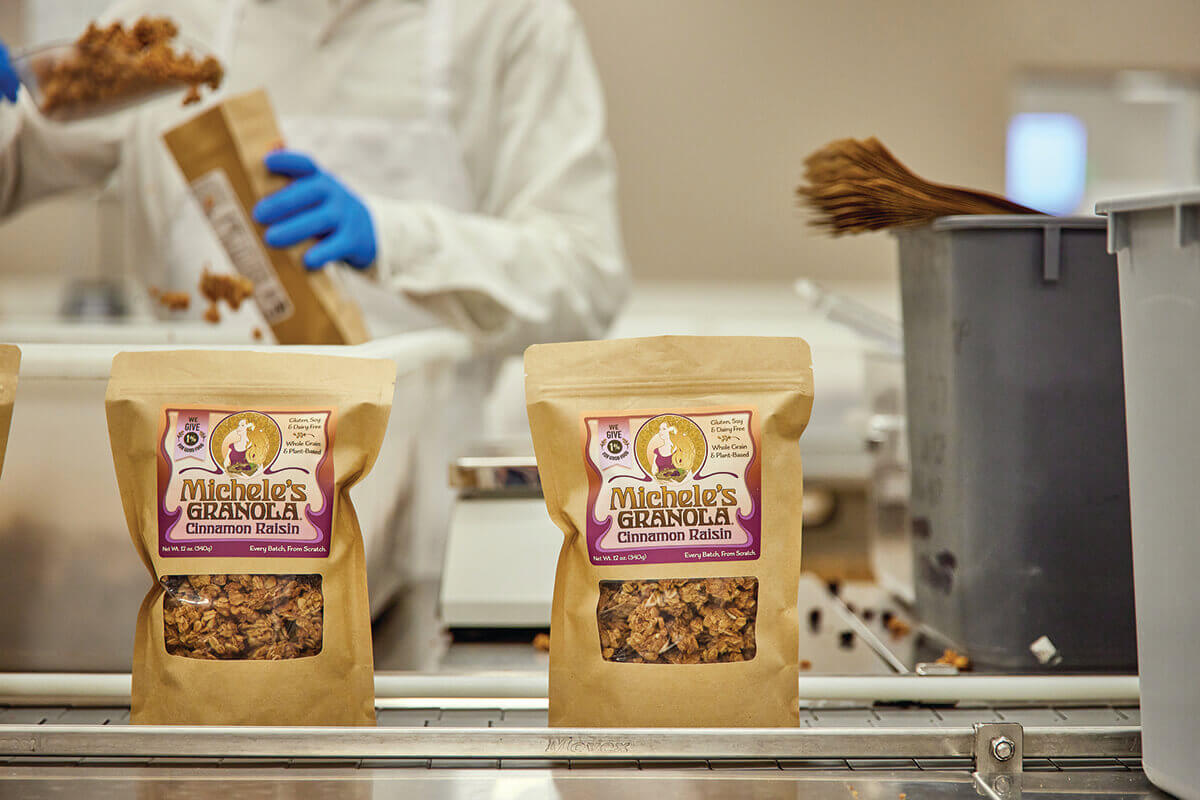
From top: Michele’s Granola hangs
together in fat, crunchy clusters; Tsucalas
checks for quality control; kitchen
staff mixes, spreads, bakes, breaks,
and bags sheets of granola in the
commercial kitchen in Timonium.
AT THE FARMERS’ MARKETS, she had noticed that many farmers sold directly to customers to avoid the lower profit margins in wholesale. But thanks to her business-school smarts, Tsucalas saw an opportunity to sell higher volumes—even if the profit margin was lower per unit—by selling at grocery stores, which at the time were just beginning to stock their shelves with local goods. “I followed the flow of what was happening with local food,” she says. “I started selling at the local co-ops—Takoma Park-Silver Spring Co-op, Glut Food Co-op in Mt. Rainer, those were our first customers.” From there, she started selling to independently owned organic markets throughout the region, including Roots, Yes! Organic Market, and MOM’s Organic Market, where the store manager set aside ingredients for her to buy in bulk and to help cut costs.

Her big break came in 2009 when the Whole Foods in Baltimore’s Mt. Washington neighborhood started carrying the pantry staple. “Tony and I had sold Michele’s Granola to practically every locally owned natural and specialty foods store in the region,” says Tsucalas, “and Whole Foods was the natural next step.” As luck would have it, the grocery manager at her first Whole Foods had formerly worked at the Takoma Park-Silver Spring Co-op, which, up until then, had been Tsucalas’ only customer, and was already a fan.
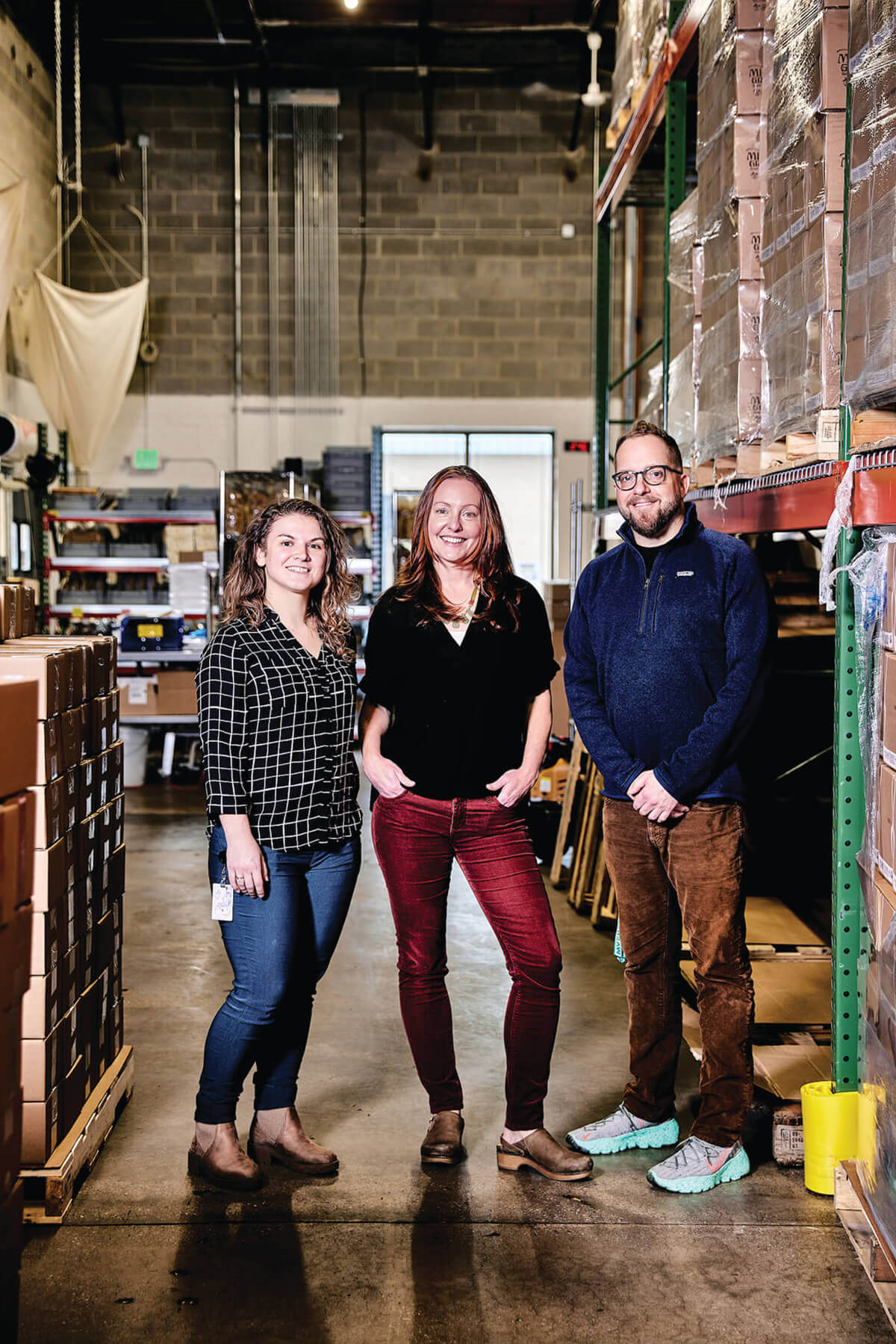
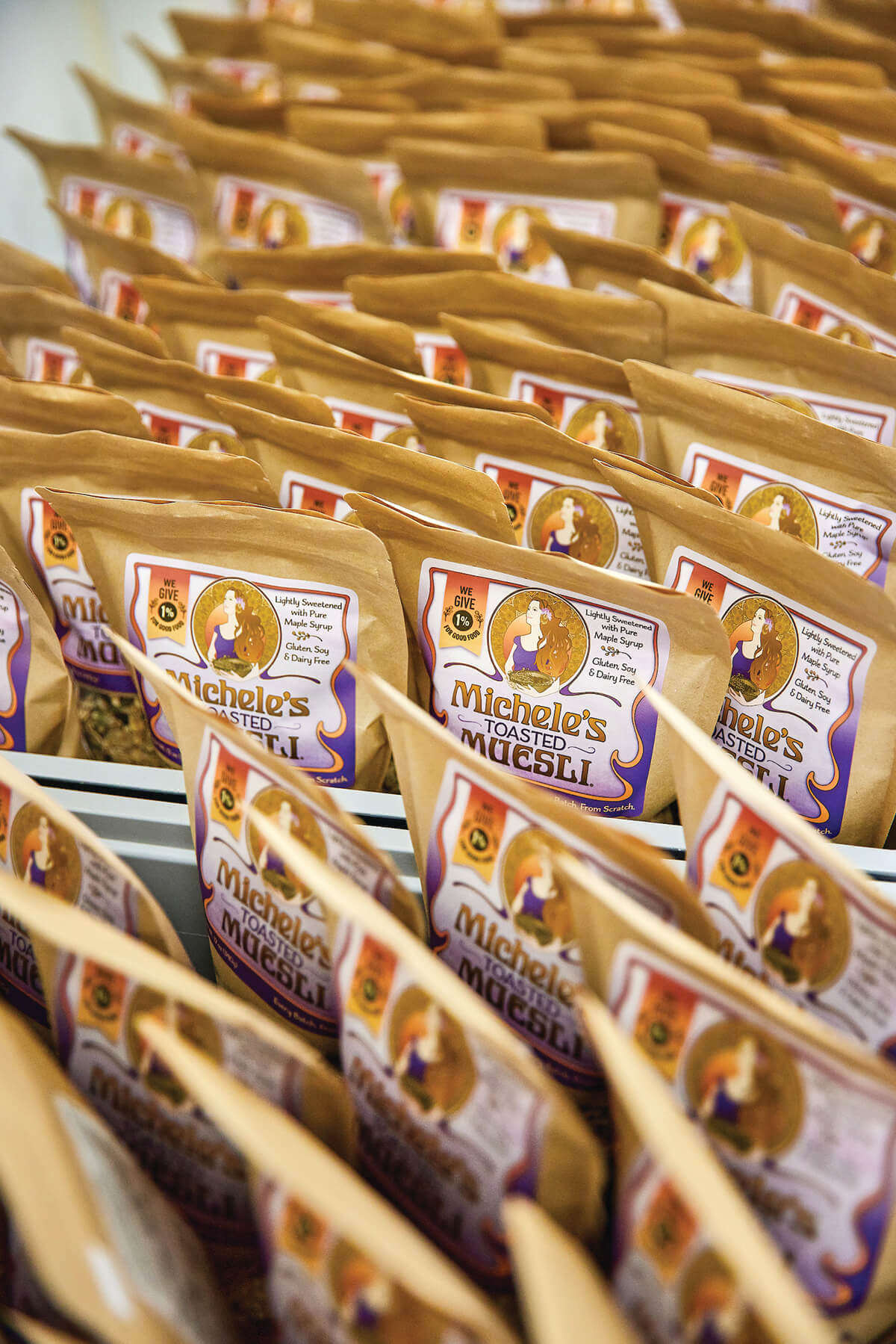
From left: Sam Hopkins,
Michele Tsucalas, and Tony Sowa in the
warehouse facility; bags of Michele’s
Toasted Muesli.
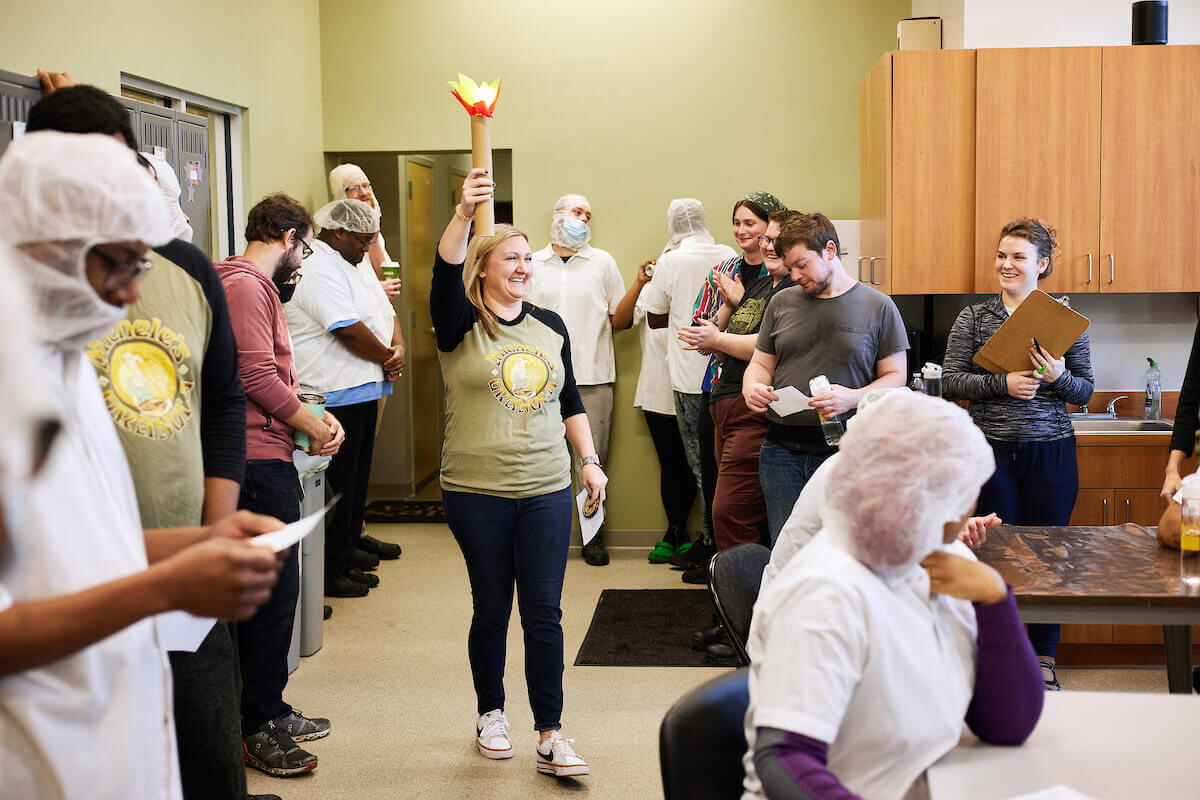
The team at the production facility.
IN THE BEGINNING, Michele’s Granola occupied a tiny row on a single end cap at Whole Foods. But the “Original” flavor bags (which are still the top-selling flavor) flew off the shelves, and soon they were being carried at the store’s bigger Harbor East location. “I was helping make it, doing deliveries, and doing all the orders,” says Sowa. “We had a Ford Excursion that was running on vegetable oil. I was literally driving around delivering the granola and calling people to sell it.” Back then, there were 60 Whole Foods in the Mid-Atlantic. Michele’s Granola was in 15 of them within that first year.
Five years after its founding, the business hit a million dollars in annual revenue, and Michele’s Granola was well on its way to becoming a small-batch behemoth. In 2010, the company moved from Curtis Bay to the former Glarus Chocolatier space on Aylesbury Road in Timonium. (Along the way, she met her husband, Justin, at Holy Frijoles in Hampden—and they married in 2013.) By 2015, the company outgrew that space and moved just down the road to the current office park on Greenspring Drive, where it has undergone several expansions, including a brand-new area for packaging and labeling.
Lisa de Lima, vice president of groceries at MOM’s Organic Market, was an early adopter of the brand when she brought it to the store in 2008. “It tasted great and the fact that she was a local vendor was icing on the cake,” says de Lima. “It has been one of the most successful local products we’ve ever carried. Customers say they want local, but don’t always buy it—Michele’s has led the way.”
And that growth has only continued. In early 2020, when the COVID-19 pandemic hit, online sales quadrupled, in part because people were staying home and “moving their dollars from restaurant spending to grocery spending,” she says.
Tsucalas never imagined the company would experience such exponential growth. “For years people asked me what my plans were, I’d say, ‘to make granola,’” she says, though her vision has expanded, including hiring a CEO and doubling her staff to a team of 83 that will increase to 100 by the end of 2023.
To diversify the brand, the entrepreneur has augmented her product line to include a series of spreadable nut butters mixed with granola. There are also two types of muesli (a toasted cereal with no oil or refined sugar) on offer, including an apple-cinnamon flavor. But the real growth, says Sowa, came from taking the brand from natural and organic food stores to conventional markets. “The current movement in grocery stores at large is to bring in the natural shopper,” he says. “It has been really awesome to see that.”
Beyond the product itself, Tsucalas takes great pride in not only being women-owned, but vegan, verified non-GMO, and sourcing organic ingredients wherever possible. She is proud of the company’s green initiatives, too, including running electricity entirely on wind power and recycling or composting 80 percent of production materials (even the packaging peanuts are made of cornstarch, which means they dissolve in water) and 100 percent of food waste.
The company also donates one percent of its sales to Give One For Good Food, a charitable network that supports local food entrepreneurs and urban farmers (and organizations such as the Baltimore Hunger Project) who are providing nutritionally balanced food to communities in need. As part of the mission, giving employees a voice is also important, including encouraging staff members to invent their own flavors. (Baker Jennifer Barrett came up with the limited-edition Toasty S’mores and even got her photo on the bag.)
Customers have taken note. “Michele’s Granola has been a staple in my home for many years—it’s always a part of my daily routine,” says Baltimore resident Hope Ayers, who favors the toasted muesli and supports the company’s commitment to social change and environmental friendliness. “Supporting women-owned and local businesses is also very important to me,” says Ayers. “By supporting them, I support all women— and our entire community.”
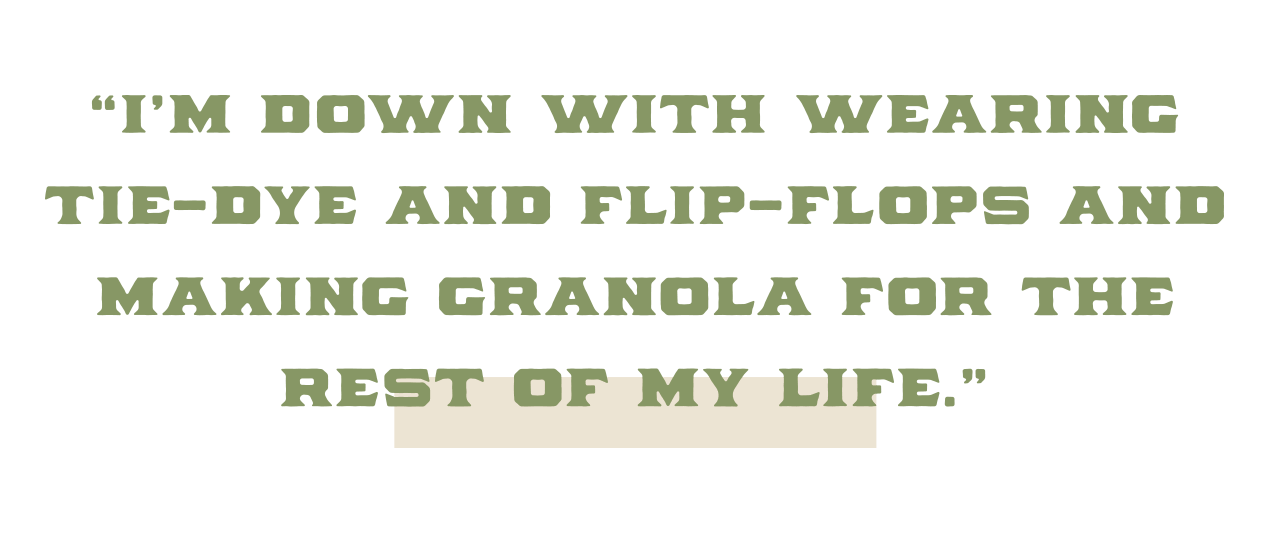
Maryland resident Jay Schlossberg receives a bi-monthly subscription of salted-maple-pecan and purchases the lemon-pistachio granola at the grocery store. “They hit all the marks,” says Schlossberg, who appreciates the company’s organic and recycling efforts. “Also, it’s some of the best granola I’ve ever eaten.”
Fortunately, fans will be able to get their fix for years to come. “Many food companies sell an idea with the intention of getting in and out, but we’re like, ‘We might be able to do this for the rest of our lives,’” says Sowa. “I’m down with wearing tie-dye and flip-flops and making granola for the rest of my life.” Tsucalas puts it like this: “My original purpose was to make granola. I thought, ‘Wouldn’t it be beautiful to make a living doing that?’”
